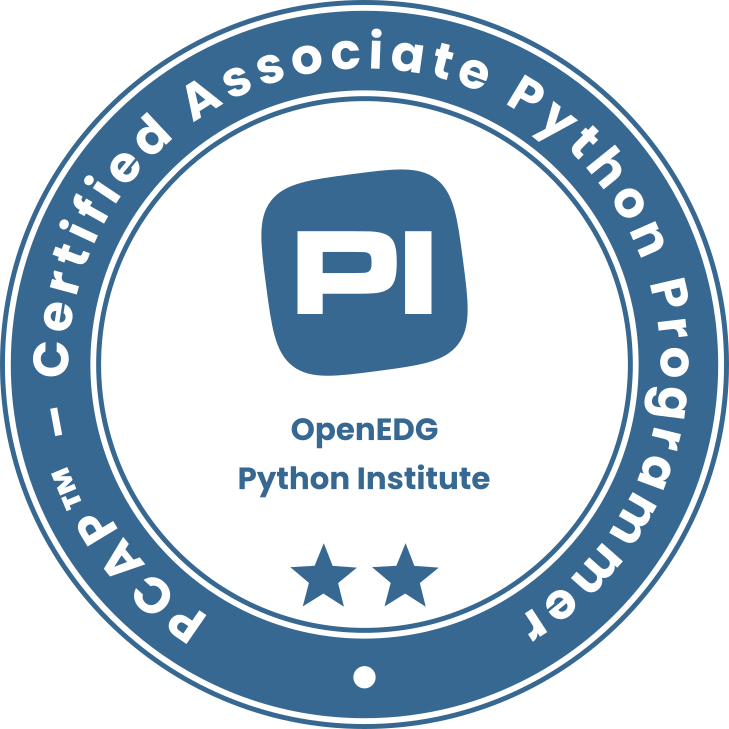PCAP™ – Certified Associate Python Programmer
(Exam PCAP-31-0x)PCAP™ – Certified Associate Python Programmer certification focuses on the Object-Oriented Programming approach to Python, and shows that the individual is familiar with the more advanced aspects of programming, including the essentials of OOP, the essentials of modules and packages, the exception handling mechanism in OOP, advanced operations on strings, list comprehensions, lambdas, generators, closures, and file processing.
PCAP™ certification gives its holders confidence in their programming skills, helps them stand out in the job market, and gives them a head start on preparing for and advancing to the professional level.
The PCAP™ certification shows that the individual is familiar with the following concepts: modules, packages, and PIP, character encoding, strings and string processing, generators, iterators, closures, files, file streams, and file processing, exception hierarchies, and exception classes and objects, working with selected Standard Library modules, and the fundamentals of the Object-Oriented Programming (OOP) approach.

Becoming PCAP™ certified ensures that the individual is fully acquainted with all the primary means provided by Python 3 to enable them to start their own studies at an advanced level, and to open a path to the developer’s career.
PCAP™ certification is an interim step to the PCPP1™ certification, a great motivator for self-improvement and self-development, and most importantly – the means to keep one's programming skills up to date and demonstrate them to others. Becoming PCAP™ certified reflects the candidate's interest in developing a higher level of proficiency and a more in-depth understanding of Python, as well as their ability to use it for commercial and non-commercial general-purpose programming projects, and create, develop, and improve their own programming portfolio to increase their value in the job market.

Become PCAP™ certified and boost your career
Python is the programming language that opens more doors than any other, and the more you understand Python, the more you can do in the 21st Century. With a solid knowledge of Python, you can work in a multitude of jobs and a multitude of industries.
PCAP™ certification is a valuable credential for individuals looking to acquire the skills and knowledge essential to continue to more advanced, more specialized, and higher paying Software Development, Security, Networking, IoT, and engineering roles. It will particularly appeal to:
- aspiring programmers and learners interested in learning programming for fun and job-related tasks;
- learners and career changers seeking a junior-level job role as a software developer, data analyst, or tester.
- industry professionals wishing to explore technologies that are connected with Python, or that utilize it as a foundation;
- aspiring programmers and industry professionals looking to build a solid foundation for further studies in more specialized areas, such as testing, data analytics, machine learning, IoT, and web development;
- team leaders, product managers, and project managers who want to understand the terminology and processes in the software development cycle to more effectively manage and communicate with production and development teams.

Oliver France
Senior Forensics Data Analyst at PwC Australia, Sydney"If you are working as a Data Analyst and want to open your career to Data Science, the Certified Associate Python Programmer certification is a must!"
Python is either the highest-paid, or one of the highest-paid languages in all parts of the world today, and the salaries range between $90,000 and $130,000 a year (source: SalaryExpert.com).
With the ever-increasing reliance on the Internet, and with Python playing an ever-growing role, the salary of the average Python programmer is almost surely to rise.
Currently, there are 100,000+ unfulfilled Python jobs around the world, and the supply of qualified Python programmers is unable to match the demand.
PCAP™: Exam Information
| SPECIFICATIONS ITEM | DESCRIPTION |
|---|---|
| Exam name | PCAP™ – Certified Associate Python Programmer |
| Exam Code & Current Exam Versions | PCAP-31-03 (Status: Active)
PCEP-31-02 (Status: Retired) |
| Pre-requisites | None |
| Validity | Lifetime |
| Exam Duration | Exam: 65 minutes, NDA/Tutorial: 10 minutes |
| Number of Questions | 40 |
| Format | Single- and multiple-select questions | Python 3.x |
| Passing Score | 70% |
| Languages | English |
| Cost | USD 295 (Exam)
|
| Delivery Channel | Pearson VUE: Authorized Pearson VUE Testing Centers + OnVUE Online Proctoring from Pearson VUE
OpenEDG Testing Service: 2022 pilot, limited availability |
| Testing Policies | PCAP-31-0x Testing Policies – Click here to view Testing Policies |
| Exam Syllabus | PCAP-31-0x Exam Syllabus – Click here to view Exam Syllabus |
| Associated Certifications | PCEP – Certified Entry-Level Python Programmer (Exam PCEP-30-0x)
PCPP1 – Certified Professional in Python Programming 1 (Exam PCPP-32-10x) |
| Courses Aligned | Python Essentials 2 (Free – Edube Interactive™, an OpenEDG Education Platform)
PCAP Programming Essentials in Python (Cisco Networking Academy, Part 2, Modules 1-4) |
PCAP FAQ and Quick References
- Read the PCAP and Pearson VUE Testing Policies to make sure you follow the code of conduct, meet all the technical requirements, and know what to expect during your exam session.
- Go to pearsonvue.com/pythoninstitute, and create a Pearson VUE web account for OpenEDG exams if you haven't done it yet. (Download a PDF Tutorial)
- Go to OpenEDG Voucher Store and buy an exam voucher. You can choose between a voucher with retake and voucher + practice test bundle.
- Log in to your Pearson VUE web account and book your exam. (Download a PDF Tutorial)
- Go to OpenEDG Voucher Store and buy a practice test voucher. (skip this step if you already have a voucher)
- Create an OpenEDG web profile, and log in to your OpenEDG Learner Account. Then click "Practice", enter the voucher code, read and accept the terms and conditions, and activate the practice test. (Download a PDF Tutorial)
Note that if you're logged in as Test Candidate, you need to switch your role to Learner in order to be able to launch the practice test.
What next? Keep on learning, keep on mastering your Python skills, and keep on climbing the certification ladder. Sign up for Python Advanced and get yourself prepared for the PCPP1 certification to take your career to an even higher level.